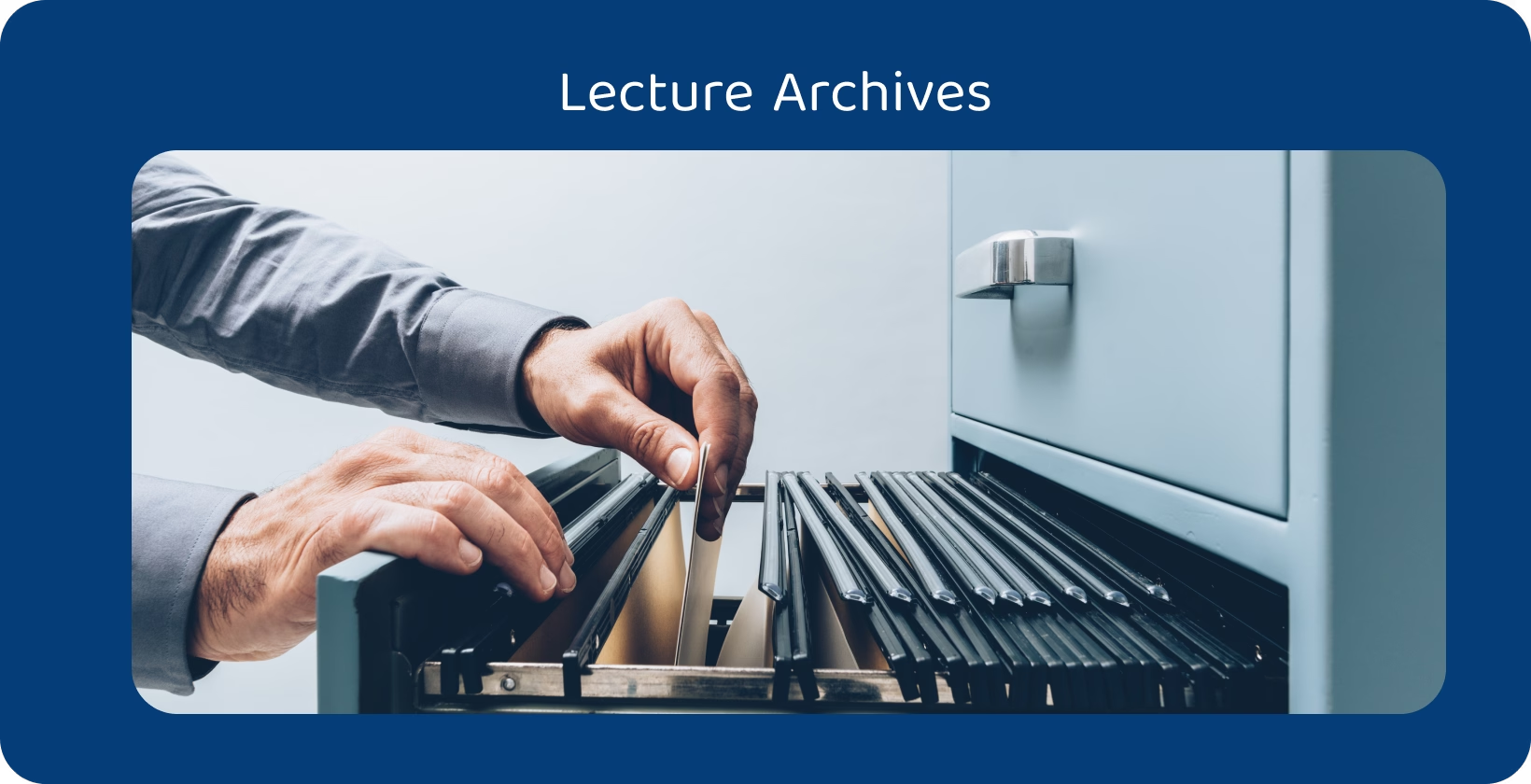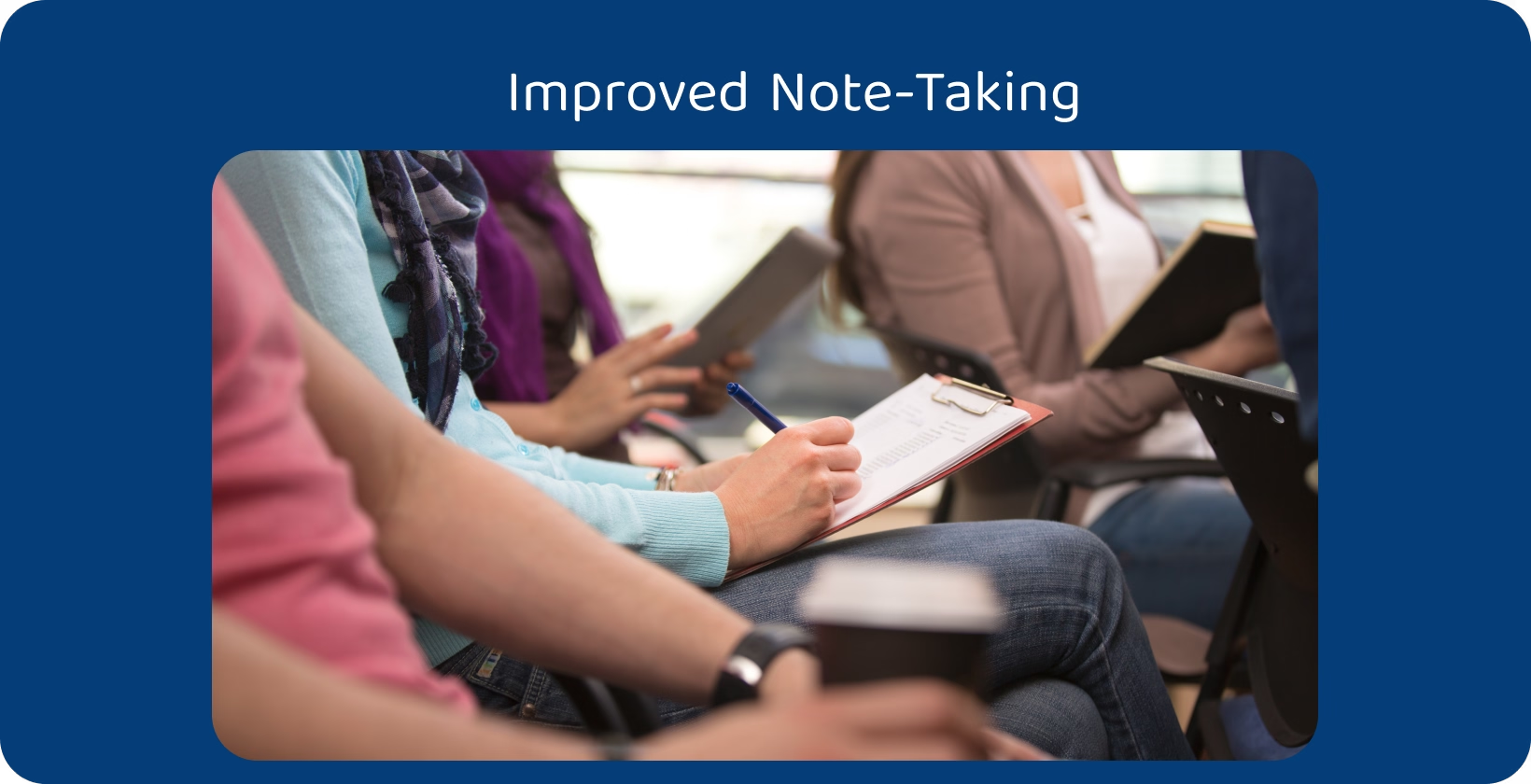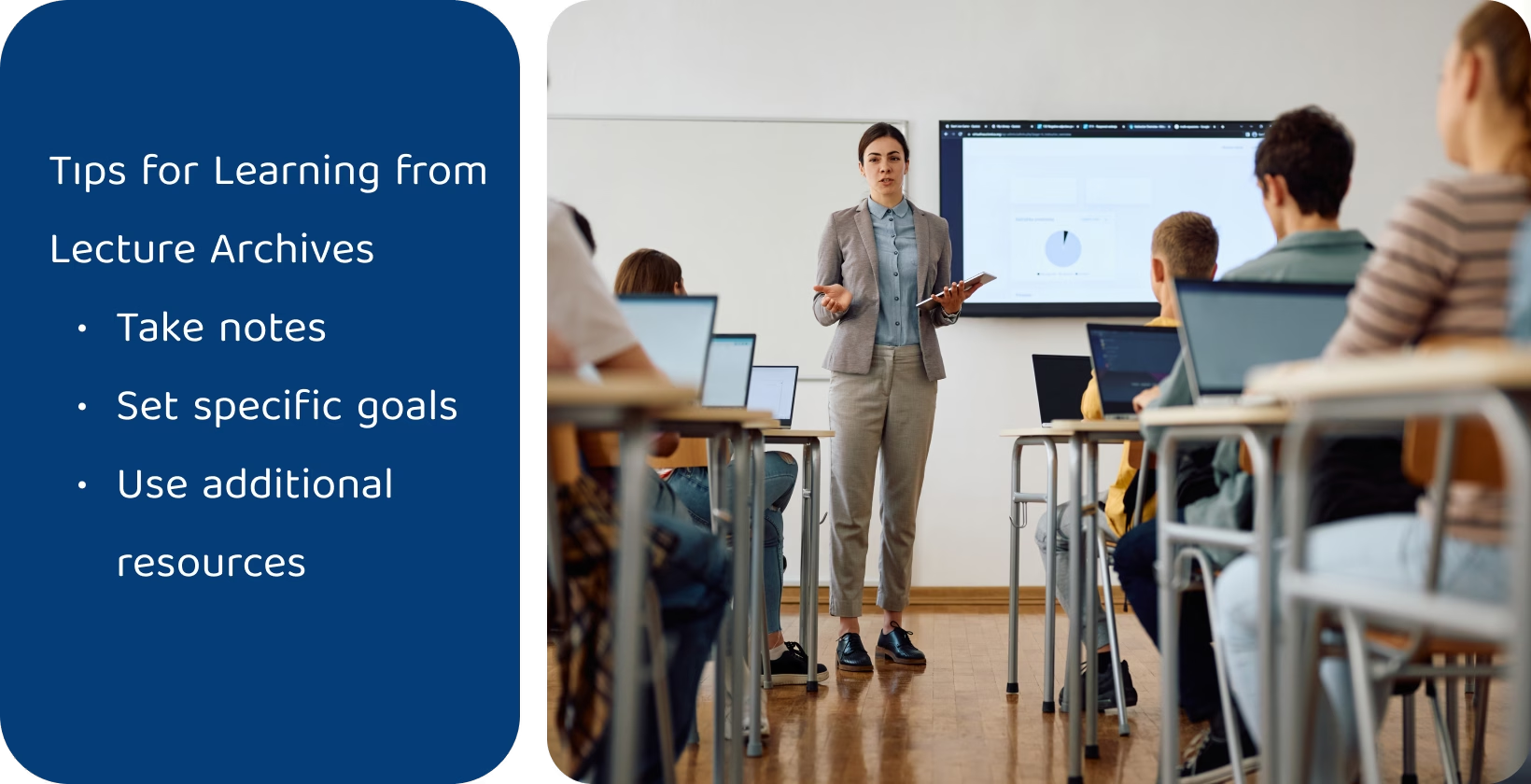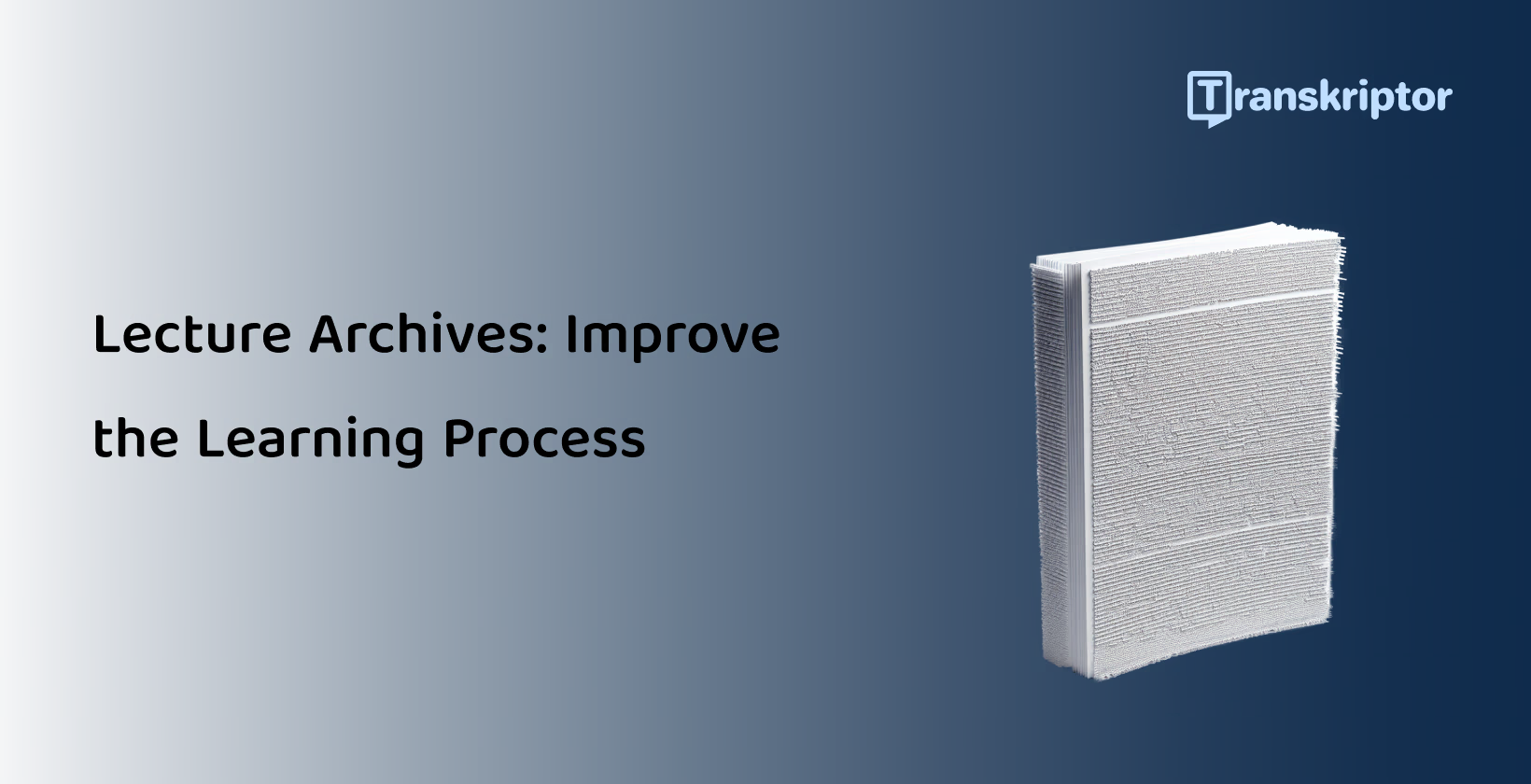Transkriptor generates accurate transcripts of lectures , contributing to the creation of comprehensive lecture archives and aiding users in accessing and utilizing educational content more efficiently.
What is The Role of Lecture Archives in Modern Education?
Lecture archives play a crucial role in modern education. They provide students with a valuable resource for enhancing their learning process. They serve as a repository of recorded lectures , enabling students to revisit class sessions at their convenience.
Students are able to leverage these archives to reinforce their understanding of complex topics, clarify concepts, and review key points covered in class. This flexibility empowers learners to tailor their study sessions to their needs and preferences.
Lecture archives facilitate accessibility, allowing students to access course materials anytime, anywhere. This is particularly beneficial for students with diverse learning styles or those facing scheduling constraints. These archives accommodate the varied needs of modern learners by offering on-demand access to instructional content, fostering a more inclusive educational environment.
Lecture archives promote active engagement and deeper comprehension. Students are able to pause, rewind, and replay sections of lectures as needed, enabling them to digest information at their own pace.

What Are the Benefits of Lecture Archives?
The benefits of lecture archives are clear and straightforward. They offer students a versatile and indispensable resource for optimizing their learning journeys.
1. Flexible Learning
Flexible learning, facilitated by lecture archives, empowers students to tailor their educational experience to their individual needs and preferences. They have the freedom to learn at their own pace with archived lectures available on-demand, replaying sections as needed to reinforce understanding or clarify concepts.
This flexibility accommodates diverse learning styles, allowing students to engage with course material in a manner that suits their cognitive preferences. Visual learners are able to benefit from watching lectures multiple times to absorb information visually, while auditory learners are able to focus on listening to lecture content to enhance comprehension.
Flexible learning through lecture archives promotes accessibility, enabling students to overcome scheduling constraints and geographical barriers. Students are able to access archived lectures at their convenience, whether balancing academic responsibilities with work or other commitments, facilitating a more seamless integration of learning into their daily lives.
The flexibility offered by lecture archives encourages self-directed learning and autonomy. Students have the agency to determine their learning trajectory, exploring topics of interest in depth or revisiting challenging concepts until mastery is achieved.
2. Revision and Exam Preparation
Students are able to leverage lecture archives for effective revision and exam preparation, enhancing their chances of success. They are able to revisit specific lectures relevant to their upcoming assessments, reinforcing their understanding of key concepts and topics covered in class.
Students are able to identify areas of weakness or confusion and focus their study efforts accordingly by reviewing archived lectures. This targeted approach enables students to address gaps in their knowledge and build a solid foundation for exam readiness.
Moreover, archived lectures allow students to review course material at their own pace, enabling them to allocate time strategically for revision based on their individual learning needs and preferences.
Additionally, archived lectures are valuable study aids, supplementing traditional study materials such as textbooks and lecture notes. Students are able to use archived lectures to clarify complex topics, reinforce key concepts, and consolidate their understanding of course material, thereby increasing their confidence and preparedness for exams.
3. Increased Engagement
Access to lecture archives cultivates increased student engagement by alleviating the pressure of note-taking during class and promoting active participation. They are able to concentrate more on comprehending complex concepts and actively engaging in class discussions, knowing that lectures are available for review, rather than feeling overwhelmed by the need to capture every detail in their notes.
The availability of archived lectures encourages students to adopt a more interactive approach to learning . They are able to contribute to discussions confidently and revisit lecture content later for clarification or reinforcement.
Access to lecture archives fosters a sense of accountability among students, motivating them to stay actively involved in the learning process. They are more likely to stay on top of course material, participate in activities, and engage with supplementary resources to deepen their understanding with the ability to review lectures at their convenience.
4. Long-Term Reference
Lecture archives offer students a valuable long-term reference resource that extends beyond the duration of a course. Students are able to access archived lectures to revisit key concepts, refresh their understanding, and reinforce their knowledge for future studies, projects, or professional development endeavors even after the course.
The availability of lecture archives serves as a repository of valuable learning materials that students will refer back to as needed, providing a convenient way to review course content and build upon foundational knowledge over time. This long-term accessibility ensures that students will understand the subject matter comprehensively beyond the course's immediate context.
Archived lectures support students in ongoing learning and skill development initiatives as a reference point for self-directed study or research projects.

5. Improved Note-Taking
Students benefit from improved note-taking strategies facilitated by lecture archives, enhancing their ability to capture and retain essential information during class sessions. They are able to focus more on active listening and comprehension during live lectures with the availability of archived lectures, knowing that they are able to rely on the archives to review and supplement their notes later.
The Transkriptor platform further enhances the note-taking process, allowing students to generate accurate transcripts of lecture content. This feature enables students to capture detailed information efficiently, reducing the need for extensive manual note-taking and minimizing the risk of missing key points.
The availability of transcripts enhances the accessibility of lecture content for students with diverse learning needs, including those with auditory or visual impairments. Transcripts provide an alternative format for accessing course material, allowing students to engage with lecture content through reading and comprehension.
Students will streamline the note-taking process, improve the accuracy and comprehensiveness of their notes, and enhance their overall learning experience by integrating Transkriptor functionality into lecture archives.
Try Transkriptor's trial to see how it improves your note-taking. Capture lectures accurately, collaborate easily, and access translations in over 100 languages.
6. Enhanced Accessibility for Diverse Audiences
A recorded lectures archive provides lectures enhanced accessibility for diverse audiences, particularly benefiting students with disabilities who require additional support to engage with course material effectively. Students with disabilities, such as visual or auditory impairments, will have access to course content in alternative formats that accommodate their specific needs.
Lecture archives allow students with visual impairments to access course content through audio descriptions or transcripts, allowing them to engage with lecture material through auditory means. Similarly, students with auditory impairments will benefit from transcripts or captions provided alongside archived lectures, enabling them to follow along with the content more effectively.
Lecture archives support students with diverse learning styles, preferences, and accessibility requirements, ensuring all individuals have equitable access to educational resources.
7. Repurposing Content
Lecturers are able to repurpose content from lectures for various educational and professional purposes, extending the utility of archived lectures beyond the classroom. Archived lectures serve as a valuable source of information and inspiration for lecturers seeking to create supplementary learning materials, such as study guides, tutorial videos, or presentation slides.
Lecturers are able to repurpose lecture content to facilitate collaborative learning experiences, sharing archived lectures with students or colleagues to support group discussions, projects, or study sessions. This collaborative approach allows lecturers and students to leverage archived lectures as a foundation for collective learning and knowledge sharing.
Repurposing content from lecture archives enables lecturers to explore interdisciplinary connections and apply acquired knowledge to real-world scenarios. They are able to extract key insights, examples, or case studies from archived lectures to inform research projects, professional presentations, or creative endeavors.
Repurposing content from lecture archives fosters innovation and creativity as lecturers reimagine and adapt lecture material to address evolving learning needs and challenges. They are able to experiment with different formats, styles, and delivery methods to create engaging and impactful educational content by leveraging the flexibility and accessibility of archived lectures.
8. Bridging Educational Gaps
Students are able to utilize a recorded lectures archive to bridge educational gaps and address disparities in student learning outcomes. Archived lectures provide a valuable resource for those who have missed class due to illness, personal obligations, or other reasons, allowing them to catch up on missed material and stay on track with course objectives.
Lecture archives support students in overcoming language barriers or difficulties with comprehension as they revisit lectures multiple times to reinforce understanding and clarify complex concepts. This accessibility feature ensures that all students have equitable access to educational resources regardless of language proficiency or learning challenges.
Archived lectures enable students to review foundational concepts or prerequisite knowledge essential for success in more advanced coursework. They are able to strengthen their understanding of fundamental principles and bridge gaps in their academic preparation by revisiting earlier lectures, empowering them to tackle more challenging material with confidence.
Lecture archives facilitate personalized learning experiences, allowing students to tailor their study sessions to their individual needs and preferences.
9. Cost-Effectiveness
Universities benefit from lecture archives' cost-effectiveness. They provide access to educational resources without additional expenses associated with traditional learning materials.
Lecture archives are typically included in the course curriculum unlike textbooks or supplemental materials that incur extra costs, making them a cost-effective option for universities and other educational organizations.
Lecture archives eliminate the need for students to invest in expensive recording equipment or software to capture lecture content independently. Educational institutions will reduce overhead costs associated with delivering course content by providing pre-recorded lectures and passing on the savings to students.
Lecture archives offer students flexibility and convenience, reducing the need for commuting or travel expenses to attend in-person lectures. Students are able to access course materials from the comfort of their own homes or on the go, minimizing transportation costs and time constraints associated with traditional classroom settings.
The availability of a recorded lectures archive promotes efficient resource use, allowing educational institutions to maximize the value of recorded lectures across multiple courses or academic terms. Institutions will minimize duplication of efforts and optimize instructional delivery by leveraging existing content, ultimately enhancing the cost-effectiveness of education for both students and providers.

What are the Best Practices for Maximizing Learning from Lecture Archives?
Students should adopt effective strategies tailored to their individual learning preferences to optimize online learning with lecture archives. Active engagement is paramount; students benefit from taking concise notes while watching archived lectures and summarizing lectures' key points and concepts to aid comprehension and retention.
Setting specific goals for review is another essential practice. Students are able to focus their attention on relevant sections of archived lectures by identifying areas of weakness or confusion, maximizing learning from lecture archives.
Supplementary resources also enhance learning outcomes. Students will find it beneficial to supplement archived lectures with additional reading materials, online tutorials, or practice exercises to reinforce understanding and deepen their knowledge of course content.
Establishing a consistent study routine is crucial for maximizing the utility of the recorded lecture archive. Students should allocate dedicated time for reviewing archived lectures regularly, maintain a proactive approach to learning, and stay on track with course objectives.
Transkriptor for Enhanced Learning from Lecture Archives
AI-powered transcription tool Transkriptor revolutionizes online learning with lecture archives by offering users powerful tools for enhanced comprehension and collaboration. Students are able to record and transcribe lectures live with Transkriptor, ensuring accurate documentation of course content. This feature enables students to revisit lectures easily, reinforcing understanding and facilitating effective note-taking.
Transkriptor's translation capabilities allow students to access lecture transcripts in over 100 languages, promoting inclusivity and accessibility for diverse audiences. They are able to collaborate with peers on transcriptions, fostering teamwork and collective learning experiences. Additionally, Transkriptor leverages AI technology to summarize lecture content, providing students with concise and digestible overviews of complex topics.
Both students and lecturers will optimize their learning experiences, increasing engagement, comprehension, and efficiency by integrating Transkriptor into lecture archives. Transkriptor empowers students and educational institutions to leverage the full potential of lecture archives for enhanced learning outcomes.
Experience the advantages of lecture archives with Transkriptor's trial. Improve your understanding, accessibility, and engagement with course content.
Join today and elevate your learning journey with Transkriptor!


